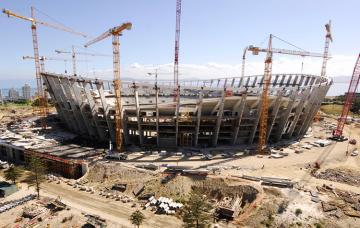SA’s construction giant to pay $4.1 million penalty
 Construction phase at the Green Point stadium in Cape Town which hosted the 2010 FIFA World Cup. FILE PHOTO
Construction phase at the Green Point stadium in Cape Town which hosted the 2010 FIFA World Cup. FILE PHOTO
South Africa’s second-biggest construction group, Murray & Roberts (JSE: MUR) has been issued with a $4.1m (R64.1m ZAR) fine for its involvement in collusive tendering in construction projects for the 2010 Fifa World Cup.
The fine, which needs to be settled by August 2016, which M&R agreed to pay in terms of a settlement agreement reached with the South African Competition Commission, was confirmed by the Competition Tribunal on Wednesday.
This is in addition to the $20 million the company had to pay in 2013, when the Commission wrapped up its fast-track investigation process into collusion in the construction sector.
Recently Murray & Roberts shares fell the most in more than four and a half years after a bridge built by the company collapsed over Johannesburg’s M1 highway at Grayston Drive Sandton. The stock dropped dropped 7.3% to R11.15 at the close on the JSE, the most since February 2011, extending its decline for the year to 48 percent.
In the 2013, the Commission fined 15 major construction firms a combined $94.6 million (R1.46 billion ZAR) for ‘rampant’ collusive tendering in the buildup to the 2010 Fifa World Cup.
Murray & Roberts' latest fine formed part of the Commission’s second phase of investigations. Sources close to tribunal proceedings said though the fine was hefty, things could have been worse for the company.
During the Commission’s first fast-track investigation, Murray & Roberts had co-operated and as such, had reportedly received a lesser penalty. Others fined during this phase included Aveng with a $19.8 (R306.57m ZAR), Wilson Bayly Holmes Ovcon (WBHO) with a $20.1 (R311.29m ZAR) fine and Stefanutti Stocks with a $19.9 (R306.89m ZAR) penalty.
South Africa’s construction sector is on the brink of a crisis
Many construction firms have reported declining profits in the last few years, mainly as a result of the global financial crisis and a lack of civil engineering activity.
Markets have recently gone from bad to worse on the global mining commodities rout and a worsening longterm slump in demand for steel products used in infrastructure.
This has seen the market capitalisation of many JSE-listed infrastructure groups drop in recent years, including for major companies with attractive price:earnings multiples such as Murray & Roberts and Aveng.
More job losses in construction are likely, with executives in the sector predicting it will continue to suffer the effects of slow economic growth and falling commodity prices during the next financial year.
South Africa’s big five construction companies all took a beating in the 2015 financial year in terms of earnings, and all had to right-size quickly, leaving thousands of construction workers without work.
“Our order books and revenue streams have been on the decline, and if we don’t get the work quickly we will have to reduce our workforce further,” Aveng CEO Kobus Verster said.
During the past financial year, the company cut 885 permanent jobs and let 6000 contract workers go.
Henry Laas, who heads Murray & Roberts, cut the company’s workforce by between 15% and 20% across several divisions.
Group Five CEO Eric Vemer let 2600 people go during the past financial year.
Employment in construction is mostly cyclical, and closely linked to economic activity and the roll-out of projects.
The government has promised to roll out infrastructure projects of more than R800-billion over the next year.
But Laas pointed out that the money was mainly being spent on rail rolling stock and roads, and not on civil engineering projects, leaving a glut of skilled people without projects to work on.
Verster said the construction sector was worse off now than it was after global markets collapsed six years ago.
“Back then we had a number of big projects to work on in South Africa because of . the World Cup,” said Verster.
Construction companies were heavily fined for collusion on World Cup projects, which ate into their bottom lines during the past financial year.
Verster said the industry had been in constructive talks with the government to mend relationships.
Most Popular
Watch: A Credible Market, the need for Standards in Property Industry
Valuation standards have a significant role to play in helping to regulate professional practice at national, regional and global levels, promoting professional ethics, integrity, impartiality and trust in valuer activities in the property industry. ... Full story











